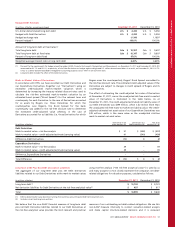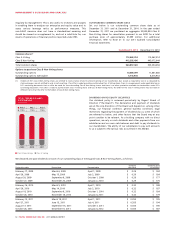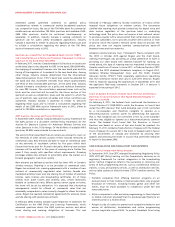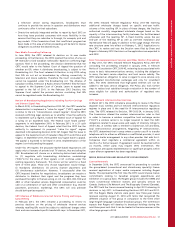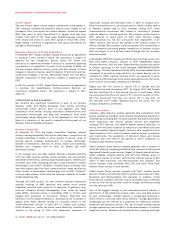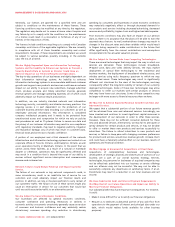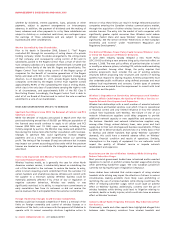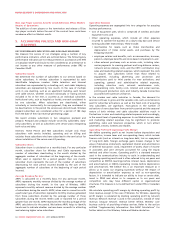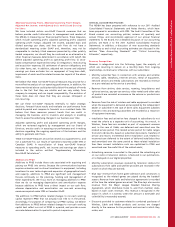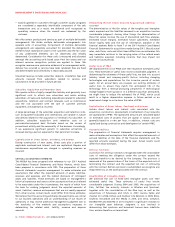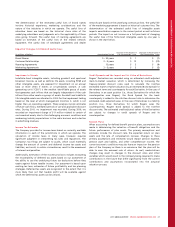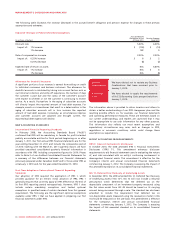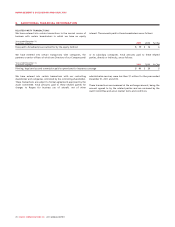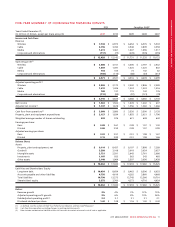Rogers 2011 Annual Report Download - page 65
Download and view the complete annual report
Please find page 65 of the 2011 Rogers annual report below. You can navigate through the pages in the report by either clicking on the pages listed below, or by using the keyword search tool below to find specific information within the annual report.
MANAGEMENT’S DISCUSSION AND ANALYSIS
• Increase our vulnerability to general adverse economic and industry
conditions;
• Limit our flexibility in planning for, or reacting to, changes in our
business and the industry in which we operate;
• Place us at a competitive disadvantage compared to some of our
competitors that have less financial leverage; and
• Limit our ability to obtain additional financing required to fund
working capital and capital expenditures and for other general
corporate purposes.
Our ability to satisfy our obligations depends on our future operating
performance and on economic, financial, competitive and other
factors, many of which are beyond our control. Our business may not
generate sufficient cash flow and future financings may not be
available to provide sufficient net proceeds to meet these obligations
or to successfully execute our business strategy.
We Are Reliant on Third Party Service Providers Through
Outsourcing Arrangements.
Through outsourcing arrangements, third parties provide certain
essential components of our business operations to our employees
and customers, including payroll, call centre support, installation and
service technicians, certain information technology functions, and
invoice printing. Interruptions in these services can adversely affect
our ability to provide services to our customers.
We Are Heavily Involved in Operational Convergence.
In an effort to more efficiently serve our customer base, there is an
ongoing emphasis on convergence of our wireless and cable
operations, including organization structure and network platforms.
We have also commenced an enterprise-wide billing and business
support system initiative. In the event that implementation of our
convergence plans lead to operational problems or unforeseen delays
are incurred, operational efficiencies may not be achieved and service
impairment may result in loss of revenue and customers.
Our Businesses Are Complex.
Our businesses, technologies, processes and systems are operationally
complex. A failure to execute properly may lead to negative customer
experiences, resulting in increased churn and loss of revenue.
Copyright Tariff Increases Could Adversely Affect Results of
Operations.
Copyright tariff pressures continue to affect our services. If fees were
to increase, such increases could adversely affect our results of
operations.
We Are and Will Continue to Be Involved in Litigation.
In August 2004, a proceeding under the Class Actions Act
(Saskatchewan) was commenced against providers of wireless
communications in Canada relating to the system access fee charged
by wireless carriers to some of their customers. The plaintiffs are
seeking unspecified damages and punitive damages, effectively the
reimbursement of system access fee collected. In September 2007, the
Saskatchewan Court granted the plaintiffs’ application to have the
proceeding certified as a national, “opt-in” class action. The “opt-in”
nature of the class was later confirmed by the Saskatchewan Court of
Appeal. As a national, “opt-in” class action, affected customers
outside Saskatchewan have to take specific steps to participate in the
proceeding. In February 2008, our motion to stay the proceeding
based on the arbitration clause in our wireless service agreements was
granted and the Saskatchewan Court directed that its order in respect
of the certification of the action would exclude from the class of
plaintiffs those customers who are bound by an arbitration clause.
In August 2009, counsel for the plaintiffs commenced a second
proceeding under the Class Actions Act (Saskatchewan) asserting the
same claims as the original proceeding. This second proceeding was
ordered conditionally stayed in December 2009 on the basis that it
was an abuse of process.
The Company’s appeal of the 2007 certification decision was dismissed
by the Saskatchewan Court of Appeal. The Company is applying for
leave to appeal to the Supreme Court of Canada. We have not
recorded a liability for this contingency since management’s
assessment is that the likelihood and amount of any potential loss
cannot be reasonably estimated. If the ultimate resolution of this
action differs from our assessment and assumptions, a material
adjustment to our financial position and results of operations could
result.
In June 2008, a proceeding was commenced in Saskatchewan under
that province’s Class Actions Act against providers of wireless
communications services in Canada. The proceeding involves
allegations of, among other things, breach of contract,
misrepresentation and false advertising in relation to the 911 fee
charged by us and the other wireless communication providers in
Canada. The plaintiffs are seeking unquantified damages and
restitution. The plaintiffs intend to seek an order certifying the
proceeding as a national class action in Saskatchewan. Any potential
liability is not yet determinable.
In December 2011, a proceeding under the Class Proceedings Act
(British Columbia) was commenced against providers of wireless
communications in Canada relating to the system access fee charged
by wireless carriers to some of their customers. The proceeding
involves, among other things, allegations of misrepresentations
contrary to the Business Practices and Consumer Protection Act (BC).
The Plaintiffs are seeking unquantified damages and restitution. Any
potential liability is not yet determinable.
In August 2008, a proceeding was commenced in Ontario pursuant to
that province’s Class Proceedings Act, 1992 against Cable and other
providers of communications services in Canada. The proceedings
involved allegations of, among other things, false, misleading and
deceptive advertising relating to charges for long-distance telephone
usage. The plaintiffs were seeking $20 million in general damages
and punitive damages of $5 million. This proceeding was settled in
December 2011 and the settlement amount was insignificant.
We believe that we have adequately provided for income and indirect
taxes based on all of the information that is currently available. The
calculation of applicable taxes in many cases, however, requires
significant judgment in interpreting tax rules and regulations. Our tax
filings are subject to audits, which could materially change the
amount of current and deferred income tax assets and liabilities and
provisions, and could, in certain circumstances, result in the
assessment of interest and penalties.
There exist certain other claims and potential claims against us, none
of which is expected to have a materially adverse effect on our
consolidated financial position.
Our Holding Company Structure May Limit Our Ability to Meet
Our Financial Obligations.
As a holding company, our ability to meet our financial obligations is
dependent primarily upon the receipt of interest and principal
payments on intercompany advances, rental payments, cash dividends
and other payments from our subsidiaries together with proceeds
raised by us through the issuance of equity and debt and from the
sale of assets.
Substantially all of our business activities are operated by our
subsidiaries. All of our subsidiaries are distinct legal entities and have
no obligation, contingent or otherwise, to make funds available to us
2011 ANNUAL REPORT ROGERS COMMUNICATIONS INC. 61


